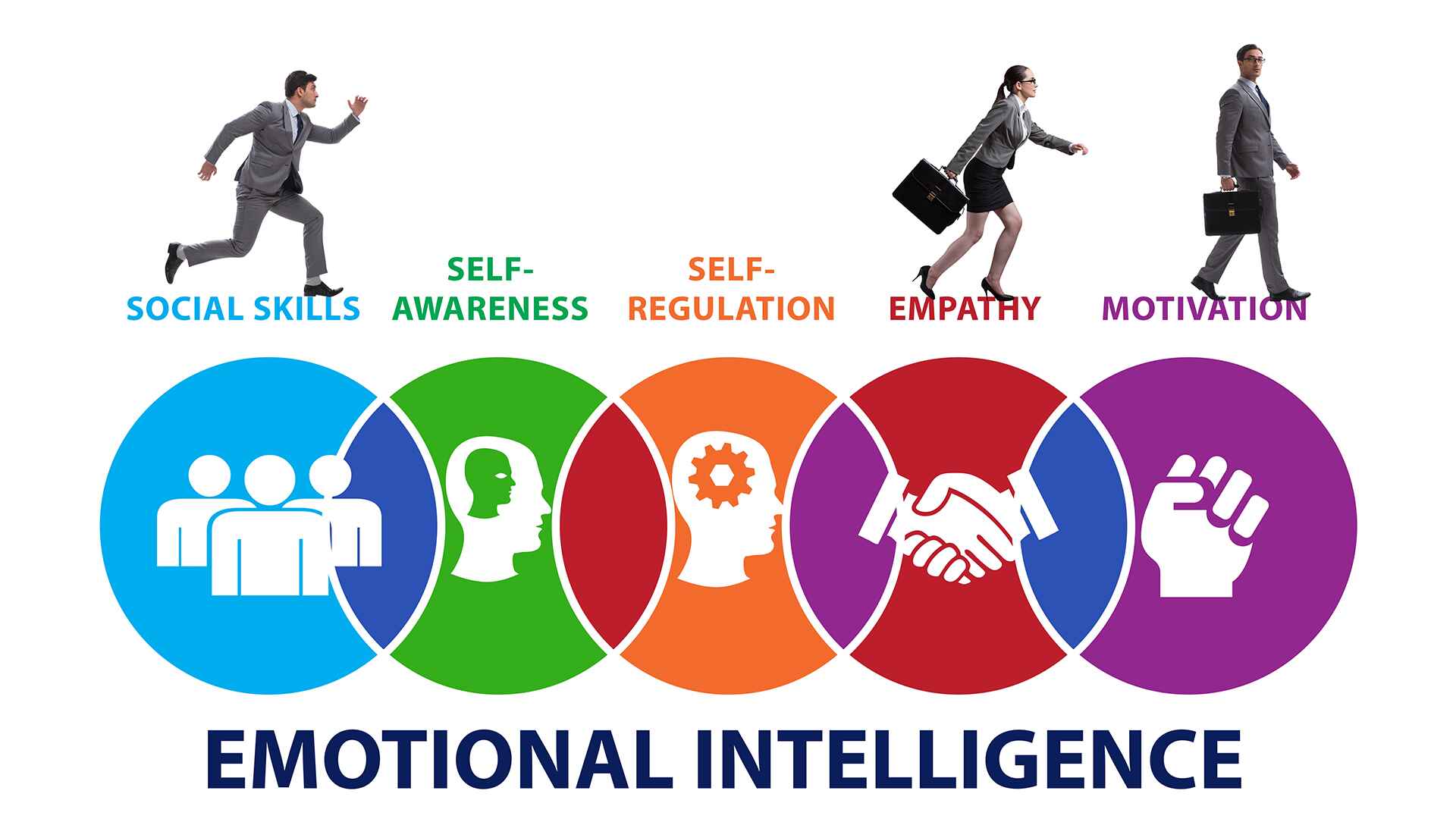
Two parameters used by leaders to evaluate performance are efficiency and timeliness. However, in the long run, using these parameters may stifle the growth of their people resulting in higher employee turnover.
Schedule a call with a Pragati Leadership expert to discuss how we can support your strategic objectives.
Schedule your CallToday’s competitive and fast-paced environment requires leaders to possess different types of hard and soft skills. While technical expertise is important, a crucial soft skill today’s leaders must possess is emotional intelligence (EI). It is the ability to manage, recognize, and understand their own and other people’s emotions.
What is Emotional Intelligence?
EI is the ability to control and manage one’s own emotions while being able to recognize and understand other people’s emotions. This term was first used by John Mayer and Peter Salovey in 1990 but has recently gained immense popularity.
Emotional intelligence primarily comprises four components:
1. Self-awareness
Self-awareness is the ability to understand one’s emotions and be in control. Additionally, this helps leaders understand other people’s emotions while controlling and guiding their teams. This ensures they make the appropriate decisions that encourage their people’s growth and organizational prosperity.
2. Self-management
This is the ability that enables leaders to manage their emotions, especially in challenging situations. Additionally, it refers to the positive perspective leaders maintain in adverse conditions. Self-management skills are an important component of emotional intelligence training programs and teach them on how to react in difficult situations emphasizing a calm attitude and mental peace.
3. Social awareness
Leaders must be aware of the business environment, which helps them to formulate and implement the right strategies that adapt to the heterogeneous market environment. It also includes empathy that helps them to understand the emotions and perspectives of others encouraging collaboration and open communication for enhanced performance.
4. Relationship management
Emotional intelligence training for leaders imparts abilities that enable leaders to actively resolve conflicts, coach, mentor, and train their team members. Additionally, the training programs provide insight on how to identify potential conflicts and keep them at bay before these escalate. Lesser conflicts increase job satisfaction and bring harmony within the teams, which plays an important role in improving employee performance and organizational growth.
Importance of emotional intelligence training for leaders
Leaders must possess high EI as it plays a crucial role in developing strong relationships, fostering a collaborative culture, and promoting a positive working environment. Emotionally intelligent leaders are adept at inspiring and motivating their team members, resolving conflicts, and adapting to any changes. The best emotional intelligence training company ensures participants learn new abilities and skills that enable them to become effective leaders.
Here are some strategies learnt in an EI training program:
Conflict resolution
Conflicts are inevitable when teams work together. Effective leaders can constructively and positively manage conflicts. They stay calm and composed in conflicting situations and empathize with all people involved to find a win-win solution for everyone resulting in improved teamwork and stronger relationships.
Strong relationships
Emotionally intelligent leaders build better rapport and trust within their teams through empathy. Training programs impart the participants with strategies that help to create a positive and supportive environment ensuring their team members feel appreciated and valued. This enhances job satisfaction, higher engagement, and motivation which translates to increased performance and productivity.
Efficient decision-making
Efficient decision-making is an important skill to be a successful leader. Participants of EI training programs acquire the ability to recognize and understand their own emotions encouraging informed and rational decision-making. They also learn empathy which allows them to consider the perspectives and needs of their team members while making decisions. This ensures improved decision-making capabilities that align with the overall organizational goals and values.
Effective communication
An important skill learnt during EI training is effective communication. These skills allow leaders to communicate their goals, expectations, and vision clearly and concisely to their team members. Communication also includes active listening skills, which enables participants to identify non-verbal cues empathize with their team members and understand their perspectives.
Inspiring and motivating team members
Emotionally intelligent leaders can inspire and motivate their team members to achieve their personal and organizational goals. The abilities learnt in the training program equip them with the ability to recognize and understand other people’s emotions to create a positive and supportive organizational culture. They can communicate effectively and develop robust relationships that inspire others to go beyond their potential thereby improving productivity and job satisfaction.
Emotional intelligence is an important skill for modern leaders. Self-aware, empathetic, and socially skilled leaders can build stronger relationships, effectively resolve conflicts, and make informed decisions. Enroll in an effective EI training program today to become a successful leader. Explore Pragati Leadership‘s EI training programs to enhance your leadership skills. To start your transformative journey today, call us right now.
Share on Social Channels
Our Categories
Categories
- Behaviorial (7)
- Blog (279)
- Certified People Manager Program (5)
- Coaching (9)
- Corporate Trainers (7)
- Developing Collaboration (12)
- Emotional Intelligence Training (13)
- Executive Leadership Program (30)
- First Time Manager Training (13)
- Growth Mindset Course (3)
- Inspirational Leadership (23)
- Inspiring and Successful Leadership Awards (23)
- Leadership Awards (44)
- Leadership Development (127)
- Leading Virtual Teams (6)
- Management Development (29)
- Marketing (2)
- Negotiation Skills Training (8)
- Organizational Transformation (25)
- Others (24)
- Stakeholder Management (3)
- Strategic Leadership Development Program (4)
- VUCA Leadership (2)
- Wholesome Leadership (23)
- Women Leadership (16)
Recent Insights
“Leadership is not about a title or a designation. It’s about impact, influence, and inspiration”....
“We need women at all levels, including the top, to change the dynamic, reshape the...
“Executive presence isn’t something you are born with – it’s something you can cultivate. And...
“Transformational leadership focuses on developing, inspiring, and motivating followers to reach their full potential rather...
“Every expert was once a beginner. Embrace the journey”. Startups face unique challenges and have...
